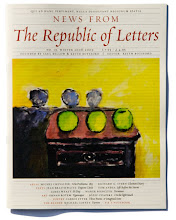ALARUMS IN THE EXTREME ORIENT
The last time I looked, that Far East – nothing like our own empty Far West – contained about three quarters of the world’s population. You would not be surprised, in what was Bombay and Peking or Colombo, in Jakarta, Hong Kong or Calcutta, to find yourself unable to move for the human press. In a restaurant I visited, the kitchen walls were hung with ducks drying; they served, they said, twenty thousand of them a day. Even given the sense of Japanese order, a square foot of pavement is honored if occupied; in Beizhing, if you took a car, eighty thousand bikes settled in front of you at every traffic light.
In those conditions, I take it that taking pot shots at a sparsely-populated island is good fun; it would relieve the tension. All the above places – everything East of Iran – have not had a moment of peace since at least a decade before their old colonial masters or their even more ancient imperial families, were removed from the scene. The wars fought in that vast territory have been among the most cruel mankind has ever endured, the longest-lasting and the most perilous to civilian populations. All of which I take to be consonant with extreme population pressures.
I don’t think, then, that it is insane, eccentric or racist, to point out that our tiny and rapidly- diminishing population of whites, is hardly likely to have any great influence on a part of the world that not only outnumbers us by a factor of about ten to one, but is also outgrowing us economically and entrepreneurially. For we are not talking here of a bunch of illiterate peasants; the populations of Asia are in fact part of our own DNA. Chess and mathematics are not ‘white’ inventions, though effective civil government and respect for the Law are. Nor so I believe that inventiveness is a ‘white’ trait. And it is becoming daily more evident that as entrepreneurs and capitalists, we are being outpaced by Asia.
So the idea that the Burmese government, the Sri Lankan, the North Korean, the Afghani and so on can and should accommodate themselves to that Johnny-come-lately ‘democracy’ strikes me as fatuous. We ourselves – in part due to our own large and miscegenated population – submit to constant weakening of the very stuff which once made us a proud nation. How can we expect to influence, shape or otherwise ‘interfere with governments which have vastly different problems from ours, whose populations (like those of the Indian sub-continent) required a bloody civil war and partition to come into independence? What experience do we have that could possibly be adapted to conditions in China or Afghanistan? These people do not even think as we do, much less act as we think they should. They neither can, nor should. The business of government is to keep any population in some sort of order, for anarchy is an even greater disaster than repression. This, Ireland, Greece and most of the European Union is beginning to understand. After all, soon enough, their demographics will soon rid them of those who dreamt up the Enlightenment.
Personally, I dread the Mass in any form. I suspect most governments and politicians do so too. But in Asia masses die, daily; and are replaced. Mao was a horror as vicious and corrupt as Hitler or Stalin, but the tasks faced by these governments today are not so very different from those that brought to power those totalitarianisms. Students riot in London and are not killed. That is good. If they riot in Asia they may well be killed, that is not good. I strongly believe in circumspection, and cultivate my own garden while I may.
Lahti
2 years ago












